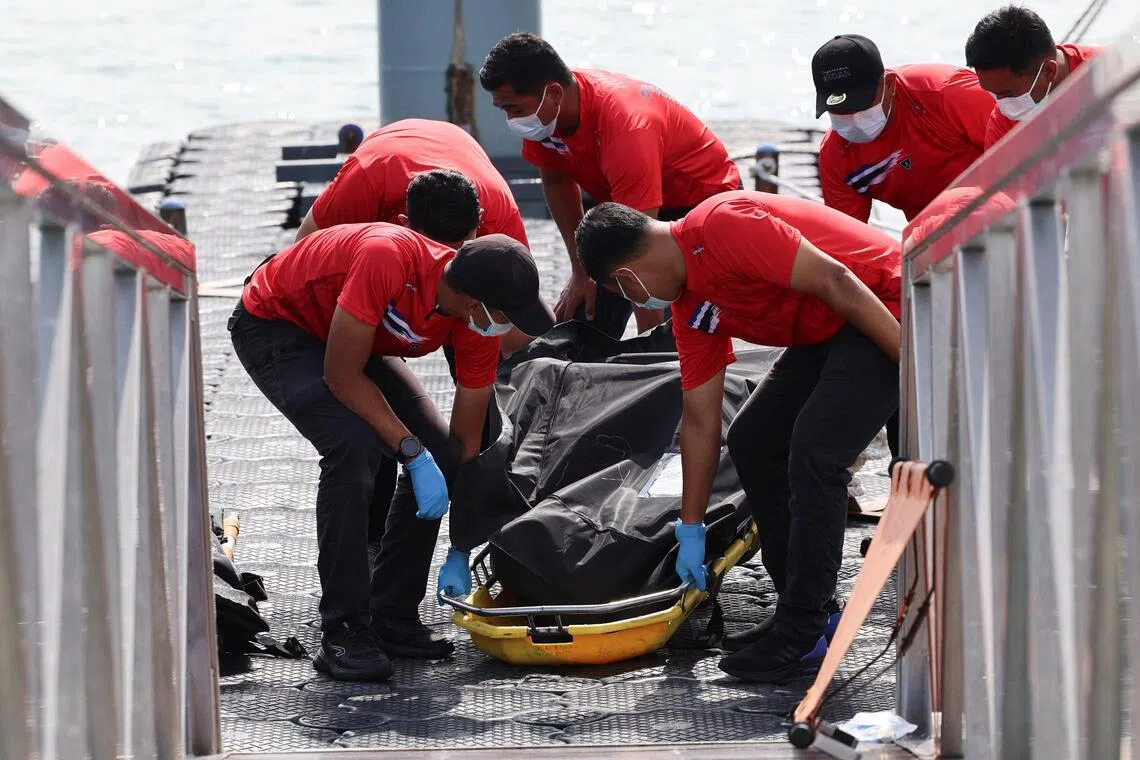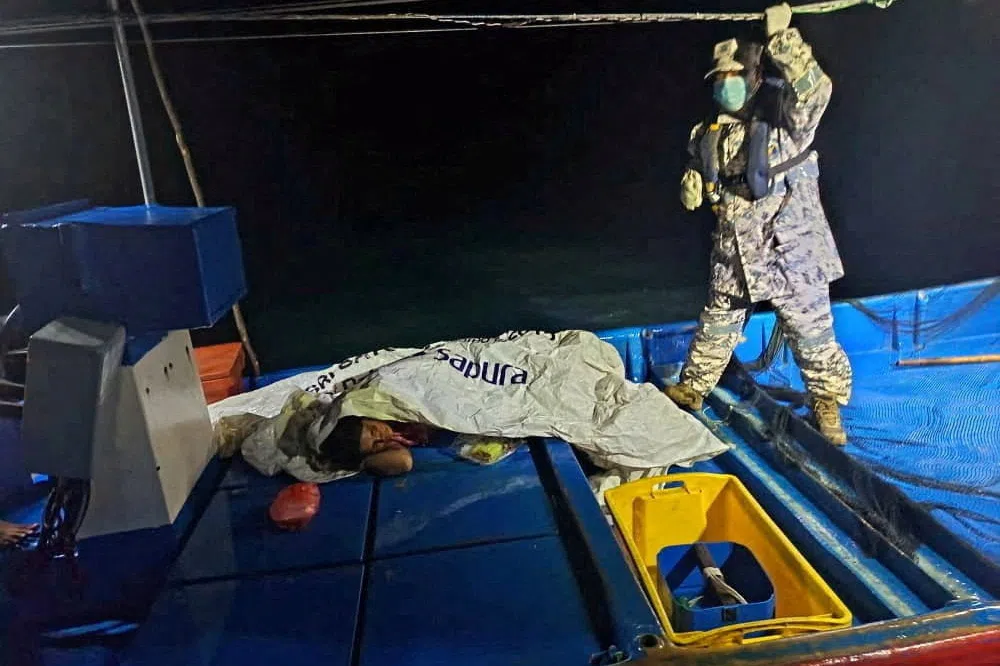Malaysia steps up search for missing Rohingya boats; at least 21 dead
Sign up now: Get ST's newsletters delivered to your inbox

Rescuers carry the body of a Rohingya refugee who died after a boat he was on sank in waters near the Thai-Malaysian border.
PHOTO: REUTERS
Follow topic:
LANGKAWI, Malaysia – Malaysian patrols searched coastal waters in the Andaman Sea on Nov 10 for dozens of members of Myanmar’s persecuted Rohingya minority, after a boat believed to be carrying them sank last week and another went missing.
At least 21 bodies have been found since the vessel went down on Nov 6 – 12 in Malaysia and nine in neighbouring Thailand – First Admiral Romli Mustafa, regional head of Malaysia’s maritime agency, told reporters.
Without life jackets, it might be difficult for many to survive even 24 hours, but some could be holding on to floating objects and search operations would continue, he added.
“Weather conditions are not so friendly but anyhow, we’re trying our level best,” Adm Romli said. So far, 13 survivors had been rescued, he added.
Hundreds of Rohingya boarded a vessel towards Malaysia two weeks ago, before being split into groups and sent to two boats on Nov 6, said Assistant Commissioner Khairul Azhar Nuruddin, police chief on Malaysia’s northern Langkawi island, from where search operations are continuing across 877 sq km.
There were around 70 people in the vessel that sank near Langkawi, while the status of another boat carrying 230 passengers
Journalists in Langkawi saw at least two more bodies being brought ashore on Nov 10, although it was not immediately clear whether they had been included in earlier counts.
Adm Romli said at least 12 vessels were searching for survivors in an area of around 250 square nautical miles, roughly the same size as Singapore. “We will continue to expand the search grid,” he said.
Facing violence at home in Myanmar and increasingly difficult living conditions in sprawling refugee camps in Bangladesh, Rohingya from both countries regularly attempt perilous journeys by sea, including to Malaysia and Indonesia.
Muslim-majority Malaysia has long been a favoured destination for Rohingya fleeing persecution, although the country does not recognise refugee status. In recent years, it has turned away boats and detained Rohingya as part of a crackdown on undocumented migrants.
Malaysian police said on Nov 10 that those rescued had been detained pending an investigation into potential immigration offences.
Myanmar’s impoverished Rakhine state
Driven from Rakhine following a brutal 2017 military crackdown, about 1.3 million Rohingya live as refugees in Bangladesh.
At a press conference on the island of Langkawi, close to the search area, Malaysia’s maritime agency said air assets were being deployed by both Thailand and Malaysia to search for survivors.
“We have got very good... relations with the Thai agency so we have got good communication and exchanges of information,” said Adm Romli.
“It will be easier for us and our sea assets,” he said of the use of air assets to support the search by boats, adding that the search operation could last seven days.
Adm Romli said information received by the agency indicated that a boat had departed from Myanmar, near the border with Bangladesh, about two weeks ago, but some passengers had moved onto another vessel on Nov 6. Of the 13 survivors found, 11 were Rohingya and two were from Bangladesh, he added.

A member of Malaysia’s maritime agency checking on a survivor who was rescued after a boat from Myanmar sank near the Malaysia-Thailand border on Nov 9.
PHOTO: REUTERS
Perilous voyages
Over 5,100 Rohingya took boats to leave Myanmar and Bangladesh between January and early November 2025, with nearly 600 people reported dead or missing, according to data from the UN Refugee Agency.
In the last week of October, multiple boats carrying Rohingya left Cox’s Bazar in Bangladesh, from where it takes between a week and 10 days to reach Malaysian waters, said Ms Chris Lewa, director of the non-profit Arakan Project, which closely tracks the voyages.
The boats might also have stopped in waters off Myanmar to pick up Rohingya coming from inland areas of Rakhine state, where a raging civil war has made displacement worse, she said.
Among those who left Cox’s Bazar was 29-year-old Mohammed Ibrahim, who took a boat to Malaysia on Oct 26, according to his elder brother Mohammed Younus.
“He left for Malaysia without telling anyone,” he told Reuters from the refugee camps, where he is frantically trying to find out his brother’s whereabouts. “If I had known, I would never have let him go. He has a wife, three children – a three-year-old son and 10-month-old twin girls. Who will take care of them?”
Some Rohingya say community members risk the perilous journeys because they see no future in Bangladesh, where foreign aid is shrinking, and they are too afraid to return to Myanmar.
“People are desperate,” said Mr Naser Khan, a Rohingya refugee in Cox’s Bazar. “People are dying in the fighting, dying from hunger. So some think it’s better to die at sea than to die slowly here.” REUTERS, AFP

